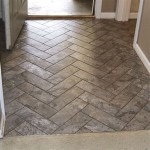Can Vinyl Flooring Be Used Outdoors?
Vinyl flooring has become a popular choice for homeowners due to its durability, affordability, and ease of maintenance. While it's primarily known for its use indoors, the question of whether vinyl flooring can be used outdoors has emerged. The answer isn't a straightforward yes or no, as it depends on several factors, including the specific type of vinyl flooring, the climate, and the intended use of the outdoor space.
Vinyl flooring is generally designed for indoor environments and is not specifically formulated to withstand the harsh elements of the outdoors. However, there are certain types of vinyl flooring that are more suited to outdoor applications than others. For instance, some vinyl tiles are specifically designed to be used in wet areas like bathrooms and kitchens, offering some level of water resistance. These may be suitable for covered outdoor spaces like patios or decks.
Types of Vinyl Flooring for Outdoor Use
While traditional vinyl flooring is not recommended for outdoor use, there are specific types of vinyl that are designed to withstand the elements. These include:
1. Outdoor Vinyl Tiles
Outdoor vinyl tiles are specifically designed for exterior applications and are made from a more durable material than standard indoor vinyl. These tiles are often thicker, have a higher UV resistance, and are waterproof. They are commonly used for patios, decks, and walkways.
2. Vinyl Plank Flooring
While not all vinyl plank flooring is suitable for outdoor use, there are varieties specifically designed for exterior applications. These planks are thicker, have a higher UV resistance, and can withstand moisture and extreme temperatures. They are often used for balconies, decks, and porches.
3. Composite Vinyl Flooring
Composite vinyl flooring combines vinyl with other materials, such as wood or stone, to create a more durable and weather-resistant product. These types of vinyl flooring are ideal for outdoor applications where high traffic and harsh weather conditions are expected.
Factors to Consider for Outdoor Vinyl Flooring
Before deciding to use vinyl flooring outdoors, it is essential to consider several factors:
1. Climate
The climate plays a significant role in determining the suitability of vinyl flooring for outdoor use. Extreme temperatures, heavy rainfall, and prolonged exposure to sunlight can all affect the vinyl's durability. Outdoor vinyl flooring requires materials that can withstand freezing and thawing cycles, UV rays, and moisture.
2. Intended Use
The intended use of the outdoor space is another crucial factor. Areas with heavy foot traffic, such as patios and walkways, will require more durable vinyl flooring than spaces that are less frequently used.
3. Installation
Proper installation is crucial for the longevity of any outdoor flooring, and vinyl is no exception. The surface must be prepared correctly, and the installation process should comply with the flooring manufacturer's guidelines. Using the right adhesive and ensuring proper drainage are also vital.
Advantages and Disadvantages of Outdoor Vinyl Flooring
Outdoor vinyl flooring offers several advantages, including its affordability, durability, and ease of maintenance. However, it has some disadvantages compared to other outdoor flooring options.
Advantages:
- Affordability: Outdoor vinyl flooring is generally more affordable than other options such as wood or stone.
- Durability: Properly installed outdoor vinyl flooring can withstand heavy foot traffic and weather conditions.
- Easy Maintenance: Vinyl flooring is easy to clean and maintain, requiring only occasional sweeping or mopping.
- Water Resistance: Outdoor vinyl flooring is waterproof, making it suitable for areas exposed to moisture.
- Slip Resistance: Some outdoor vinyl flooring options are designed with a textured surface to prevent slipping.
- Design Options: Vinyl flooring comes in various colors, patterns, and textures, offering design flexibility.
Disadvantages:
- Durability: While durable, outdoor vinyl flooring is not as durable as some other outdoor flooring options, such as concrete or tile.
- Fading: Exposure to UV rays can cause outdoor vinyl flooring to fade over time.
- Temperature Sensitivity: Extreme temperatures can affect the vinyl's flexibility and durability.
- Limited Lifespan: Outdoor vinyl flooring has a shorter lifespan than some other outdoor flooring options.
Overall, whether vinyl flooring is suitable for outdoor use depends on the specific type of vinyl, the climate, and the intended use. While some types of vinyl are designed for outdoor applications, it's important to carefully consider all factors before making a decision.

Can You Put Vinyl Flooring On A Deck

Can Vinyl Floor Be Used For Indoor And Outdoor

Patio Flooring Tufdek Waterproof Vinyl Deck Solutions

Can Vinyl Flooring Be Used Outside

The Best Outdoor Vinyl Flooring

Vinyl Patio Deck Flooring Tufdek Waterproof Decking

Exterior Vinyl Floor Decking Sugar Bee Crafts

Can You Install Vinyl Flooring Outside

Can Vinyl Flooring Be Used Outside 941 Llc

D C Fix Outdoor Floor Grey Oak 6 Ft Width X 12 Length 72 Sq Vinyl Roll Flooring Simple To Install Made For Exterior Use 2q3287 The Home








